 Beneath the trees and among the forest bed lies the quiet and mysterious world of Mycelia, a kingdom ruled by the Goddess of the Forest and populated by her mushroom subjects. The mushrooms show their devotion by delivering magical dewdrops to the Shrine of Life and, in turn, the shrine pours forth its abundance of gifts back into nature.
Beneath the trees and among the forest bed lies the quiet and mysterious world of Mycelia, a kingdom ruled by the Goddess of the Forest and populated by her mushroom subjects. The mushrooms show their devotion by delivering magical dewdrops to the Shrine of Life and, in turn, the shrine pours forth its abundance of gifts back into nature.
Mycelia is an introductory deck building game for 1-4 players, with a playtime of 45 minutes.
Gameplay Overview:
Players, with the help of the mysterious mushroom people, will use the cards from their hand to manipulate dewdrops on their personal player board to remove them to a shrine. Each player starts with a personal deck of six cards but can purchase more throughout the game to acquire stronger abilities.
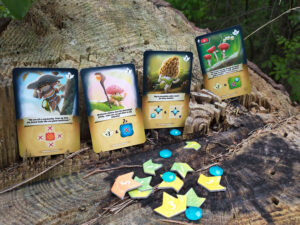
The player boards are a square grid of different terrain types. These boards are seeded at the start of the game with twenty dewdrops. On your turn, you will play all three cards from your hand, one at a time, to move dewdrops from one space to another–hopefully getting them to the special field space which will magically transport them to the shrine. Some cards allow you to remove dewdrops outright, while others will give you leaves with which you can purchase new cards. In this way, players race to be the first to remove all the dewdrops from their player board.
But there’s a catch. The goddess shrine, upon which dewdrops are placed when removed from player boards, can only hold so many drops at a time. If, at the end of any player’s turn, there is a certain number of dewdrops on the shrine (this number differs by player count), that player must rotate the disk on top of the shrine, which will cause all dewdrops to pour onto the table. Along with the drops, a die is also released, and players must place more dewdrops onto the spaces the face indicates. As such, one or two drops will be added to each player’s board every time the shrine is rotated.
Whenever a player removes the last dewdrop from their board, the final round is triggered and, if no other players cleared all their drops in the last round, that player wins; however, if multiple players have cleared their board, the player with the most leaves (i.e. currency) wins the game.
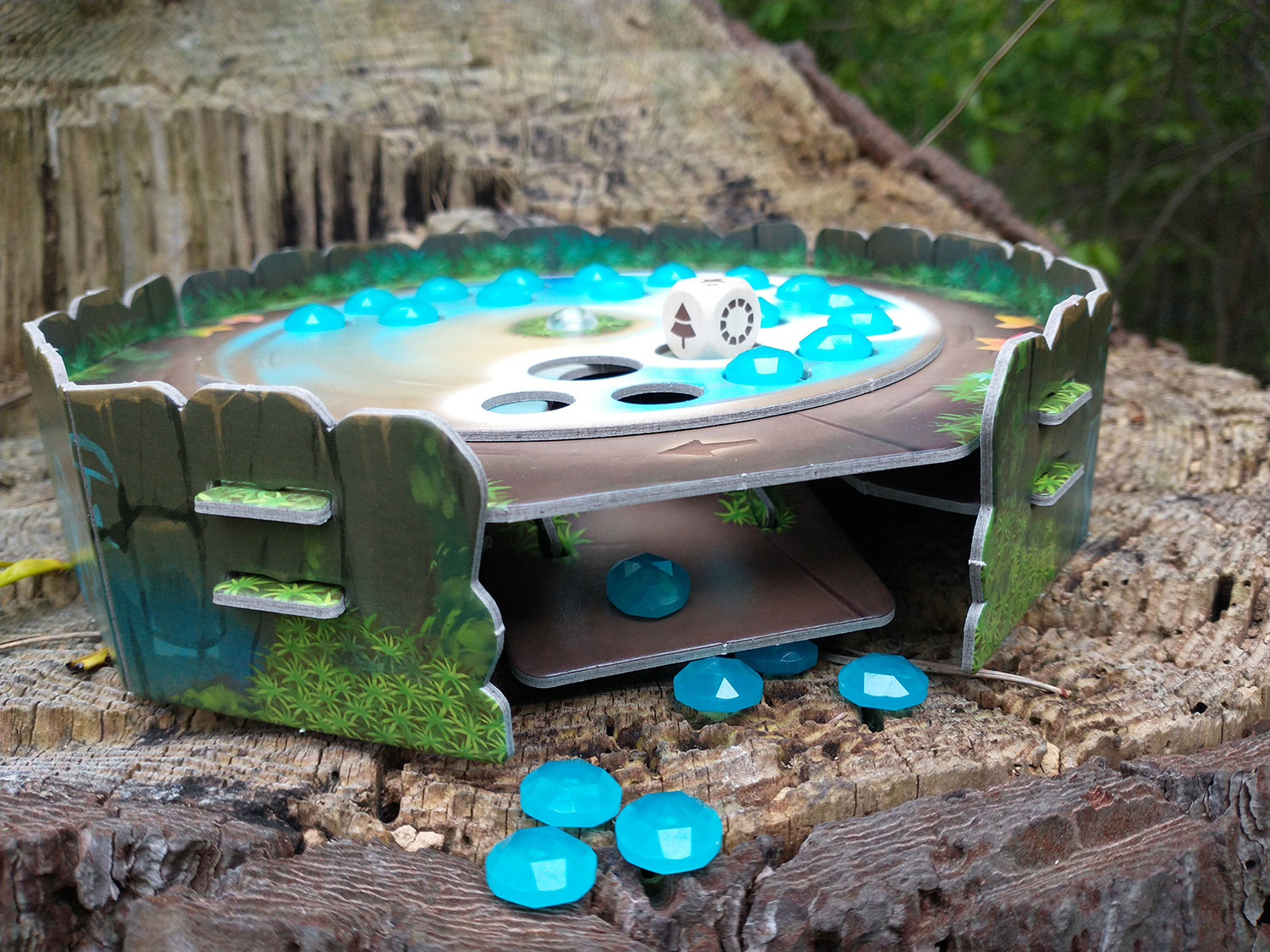
Gameplay Experience:
As a fan of deck building games in general, I was curious if Mycelia would live up to its claim of being an introduction to the mechanism. For the most part, I think it does, with one or two exceptions. The game keeps things pretty basic—your entire starting deck consists of just six cards. White more cards will be purchased and added to your deck, your hand size throughout the game is only three cards. These cards are the driving force behind your engine which will move the tokens (dewdrops) from one square to another, with some cards allowing only for movement in a specific type of terrain (i.e. move any dewdrop from grassy terrain to an adjacent space). The game is gentle and forgiving, with no cruel cards against other players, instead, some of the cards you play will actually help your opponents.
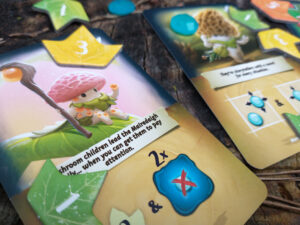
New cards purchased are also placed on top of the player’s deck, rather than the discard pile as we’re used to in many deck building games. The simplicity, combined with just the right amount of decision space, along with the gentle nature of the rules, all work nicely towards making this game welcoming.
What could be a hangup for some people is the symbology. The game is language-independent, which means anyone can play no matter which language they speak, as well as younger children. But the double-edged sword of no in-game text is the challenge of conveying information in another way. This game uses symbols and there are quite a few of them, with the difference sometimes being rather small. One card might allow you to remove a dewdrop from a space that has one, two, or three dewdrops on it, while another might allow you to remove one from a space that has exactly three dewdrops on it.
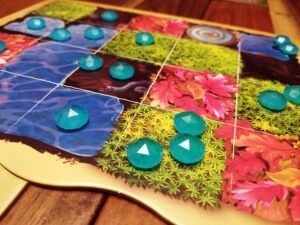
Some cards allow for double actions, such as if a space has two dewdrops you can remove one and move another to an adjacent space. But you could still take this action if the space had three or more dewdrops. After some confusion in our first game, and referencing the rule book a few times, I will say that I was quickly able to learn and interpret the symbols, as was my nine-year-old daughter who plays all sorts of games. But we’re used to interpreting symbols in games, and I wonder if someone new to the hobby might struggle with the various symbol interpretations and specific situations in this game. Nevertheless, I think anyone who sticks with it for a couple of plays should catch on and have no trouble once they’re used to it.
Working out the puzzle and trying to build an efficient hand is satisfying and there is a slight amount of pressure as you race to clear your board. What I found, however, was that by the time someone clears their board, most of the other players can do the same during the last round which makes the tiebreaker (whoever has most leaves) the deciding factor for most games, and that can feel anticlimactic. It feels as if there is simply an inevitable point in the game where any player who did decently well will clear their board, even though they’ve purchased different cards than the other players.
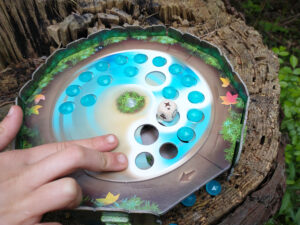
So rather than a race, it’s more a matter of how much money you’ve saved when that point is reached. This takes some tension from the game and contributes to a feeling of sameness during and between games, with no big moments or surprises. On the other hand, the game, taken as a lighter approach to deck building, manages to be enjoyable and relaxing. I just wish it felt like my decisions mattered a little bit more.
The game does include some optional rules, such as additional cards that can be added to the deck with more dynamic abilities, which are nice. Players can also use the reverse side of their board, which will differ one from another, whereas the default sides are identical, but again this didn’t really make as much of a difference as I had hoped. There is also a solo mode where you race against a bot, which I thought was done quite well.
I’ll also add that I felt somewhat confused about the theme. On the one hand, this is a fantasy game, but on the other, it features real mushroom varieties, even including the Latin names on the cards. This felt like an odd disconnect, but oh well, at least the artwork is cute.
Final Thoughts
With all of that said, I think Mycelia is a good game. It more or less succeeds at being an introduction to deck building while still being fun for seasoned players. The biggest issues I found were a sense of sameness throughout the game and an overbalance which led to nearly all games defaulting to the tiebreaker. The symbols might also be confusing during your first couple of plays. Otherwise, the game is easily learned, turns are fairly quick due to a hand size of just three cards, and the puzzle is satisfying. It’s also pretty fun to rotate the shrine and watch all those crystals spill out.
Final Rating: 3.5 Stars – Maybe more of a portobello than a morel, but still a pleasant entry level game
 Hits:
Hits:
• Fun puzzle and engine building
• Feels cozy and welcoming
• Rules are (mostly) easily understood
Misses:
• Often ends in tiebreaker
• Can feel repetitive
• Some confusing symbology





















